Foundations for Learning Series (6 vols.)
Digital Logos Edition
Overview
How should students prepare themselves for the academic rigor, intellectual challenges, and spiritual demands of education? Addressing these issues, the Foundations for Learning series is intended for all students who are considering religious education. The books in the series share practical advice on building the vital skills, practices, and values needed to succeed in religious education. The series prepares students for academic success through compelling resources that kick-start their educational journey into professional Christian service.

- Offers practical advice on building skills, practices, and values for learning in religious contexts
- Introduces the study and thought process of church history, theology, and ministry
- Prepares students to engage life and learning actively
- Title: Foundations for Learning Series
- Series: Foundations for Learning
- Publisher: Fortress Press
- Volumes: 6
- Pages: 727
- Resource Type: Introductions
- Topic: Education
Individual Titles
- Exploring Church History by Derek Cooper
- Exploring Practices of Ministry by Pamela Cooper-White; Michael Cooper-White
- Exploring Theology by Elaine A. Robinson
- Thinking Theologically by Eric. D. Barreto
- Reading Theologically by Eric. D. Barreto
- Exploring the Life and Calling by Gary Black, Jr.
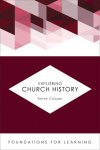
In Exploring Church History, Derek Cooper invites readers to consider the purpose and significance of church history in the lives of individuals and communities today. Rather than offering an exploration of bygone eras and outdated events, Cooper brings history to life by emphasizing how past events, individuals, and movements shape how we understand the world around us.
The book is divided into three convenient sections. While the first and second sections explain why and what we study in church history, the last section teaches readers how to study church history. The combined effect of the book is a clear and accessible introduction to the field of church history.
For anyone thinking church history has to be boring, this book is the perfect antidote. In a rapid-fire romp through the last two thousand years and around the world, Derek Cooper shows how engaging and relevant the study of the Christian past can be.
—Douglas Jacobsen, distinguished professor of church history and theology, Messiah College
Derek Cooper Derek Cooper is associate professor of world Christian history at Biblical Theological Seminary in Pennsylvania.
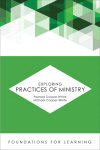
In Exploring Practices of Ministry, Pamela and Michael Cooper-White share insights from their extensive experience as parish ministers, church agency executives, and seminary educators in diverse multicultural and international contexts. Pamela, an Episcopal priest who teaches pastoral theology, care, and counseling, is also a pastoral psychotherapist with an extensive clinical background. Michael, a Lutheran pastor and seminary president, is also a pilot and flight instructor and has served as a chaplain with the Civil Air Patrol.
The authors share their wisdom with seminarians and other readers seeking to deepen theological reflection and expand skills as ministry practitioners. Exploring Practices of Ministry is helpful for anyone who engages in preaching and public speaking, teaching, leading liturgies, conducting ceremonies, counseling and offering pastoral support for persons undergoing life transitions, and serving as organizational leaders in congregations, chaplaincies, social ministries, and the public arena.
What do pastors do? Michael and Pamela Cooper-White provide a guided tour to the practices of ministry that answers this question. They make a compelling case that these practices are best engaged with a pastoral theology that unites them into patterns of meaning rather than as disjointed sets of skills.
—Daniel O. Aleshire, executive director, Association of Theological Schools in the United States and Canada
Pamela Cooper-White is the Ben G. and Nancye Clapp Gautier Professor of Pastoral Theology, Care and Counseling at Columbia Theological Seminary in Decatur, Georgia. She is author of The Cry of Tamar: Violence against Women and the Church’s Response and Many Voices: Pastoral Psychotherapy in Relational and Theological Perspective.
Michael Cooper-White is the president of Lutheran Theological Seminary at Gettysburg in Pennsylvania. He has led the school through multiple transitions, including the creation of the award-winning Seminary Ridge Museum. He teaches and writes about church administration and leadership and is a consultant to churches in Central and South America. He is also a pilot and certified flight instructor. Cooper-White is a regular columnist with Lutheran magazine.
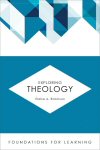
In Exploring Theology, Elaine A. Robinson introduces readers to the study of theology as a central task of all Christians and one that deserves careful and consistent attention. Following a lively examination of what theology is and how we do it, Robinson provides a basic map of the major doctrines of the faith and asks readers to consider their own beliefs at this important point in their journey. She invites readers to think of theology as a stream into which we enter and which carries us deeper into the vast ocean which is the fullness of God.
Designed for those who are beginning a more serious study of theology, Exploring Theology helps readers navigate what might, at first glance, appear as a confusing or abstract subject. Navigational aids include an introduction to theological vocabulary, the sources and methods of theology, and tips for reading primary sources as a spiritual discipline. As a result of this journey, readers will be excited to delve more deeply into theology and will recognize the many ways that theology shapes how we live out the Christian faith in the world.
Elaine Robinson provides a clear, accessible introduction to the basics of Christian theology, including a variety of exercises to engage the novice reader. She introduces many important theologians and key Christian doctrines and provides a solid foundation on which students can build further theological work.
—Kristin Johnston Largen, associate professor of systematic theology, Lutheran Theological Seminary at Gettysburg
Elaine A. Robinson is academic dean and professor of Methodist studies and Christian theology at Saint Paul School of Theology at Oklahoma City University. She is the author or editor of several books on contemporary theology and an ordained elder in the United Methodist Church.
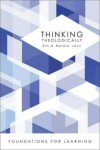
We are always—consciously and unconsciously—processing data. In this collection of essays, a variety of voices encourage readers to think about how our brains work. Authors grapple with not only the particular ways the theological disciplines invite students to think, but also how thinking theologically shapes a student’s sense of self in a wider community of thinking and believing. Thinking Theologically explores an embodied set of practices and values that shape individuals and communities alike—seeking to help readers on the path to cultivating the habits of mind necessary in a life of ministry.
Thinking Theologically is an engaging text that is clearly oriented towards the church and those who are seeking to understand Scripture and theology in light of the world’s complexities.
—Brian Bantum, associate professor of theology, Seattle Pacific University
Eric D. Barreto is associate professor of New Testament at Luther Seminary in St. Paul, Minnesota, and was ordained by Peachtree Baptist Church in 2006. He is the author of Ethnic Negotiations: The Function of Race and Ethnicity in Acts 16. He is also a regular contributor to the Huffington Post.
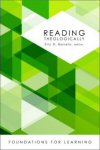
Reading Theologically, edited by Eric D. Barreto, brings together eight seminary educators from a variety of backgrounds to explore what it means to be a reader in a seminary context—to read theologically. This involves a specific mindset and posture towards texts and ideas, people, and communities alike. Reading theologically is not just about academic skill-building but about the formation of a ministerial leader who can engage scholarship critically, interpret Scripture and tradition faithfully, welcome different perspectives, and help lead others to do the same.
This concise volume emphasizes the vital skills, habits, practices, and values involved in reading theologically. Reading Theologically is a vital resource for students beginning the seminary process and professors of introductory-level seminary courses.
Reading Theologically comes as a great gift to students at seminaries and divinity schools.
—Gail R. O’Day, dean, Wake Forest University School of Divinity
Eric D. Barreto is associate professor of New Testament at Luther Seminary in St. Paul, Minnesota, and was ordained by Peachtree Baptist Church in 2006. He is the author of Ethnic Negotiations: The Function of Race and Ethnicity in Acts 16. He is also a regular contributor to the Huffington Post.
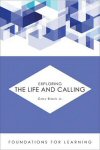
Author and professor Gary Black asserts that the most important aspect of training for vocational ministry is knowing and applying Christian theology. Theology must be woven throughout the entire seminary curriculum—biblical exegesis, ministerial leadership, spiritual formation, counseling, preaching, and worship.
Black honors ministers as leaders who follow in the footsteps of Christ. Jesus was an expert in the issues of his day, demonstrated authority, mentored other leaders, inspired his disciples to imitate his life, and instigated a spiritual revolution—and Black says ministers of the gospel have received the same calling. Black’s practical wisdom and theological commitments provide a firm, guiding hand for those just beginning their journey toward vocational ministry.
Black presents a renewed and stirring vision of theological education that is able to produce men and women who intimately know about life in the Kingdom of God. Our world is desperate for this.
—Kent Carlson, senior pastor, Oak Hills Church
Gary Black, Jr. is chair of the advanced studies department, director of the doctor of ministry program, and assistant professor of theology at Azusa Pacific University. He is the author of The Theology of Dallas Willard: Discovering Protoevangelical Faith.
This title is included in the following collections
You can save when you purchase this product as part of a collection.
Logos 8 Lutheran Bronze Legacy...
$89.99$89.99Logos 7 Lutheran Bronze Legacy...
$89.99$89.99Logos 9 Lutheran Bronze Legacy...
$89.99$89.99Logos 8 Lutheran Silver Legacy...
$349.99$349.99
- $349.99
- $349.99
- $849.99
- $849.99
- $849.99
- $1,499.99
- $1,499.99
- $1,499.99
- $2,999.99
- $2,999.99
- $2,999.99
- $4,749.99$3,562.49
- $4,749.99
- $4,749.99
- $4,749.99
- $23,999.99$17,999.99
- $21,749.99
- $24,999.99